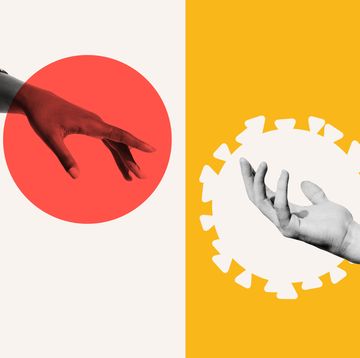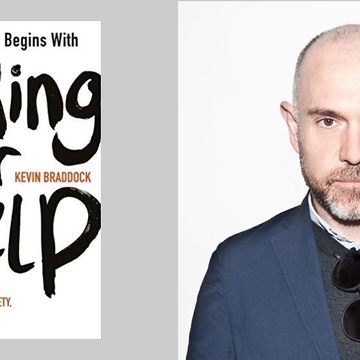"This corridor looks like The Shining," I say into the back of the man leading me over a particularly unsettling geometric carpet. "Yes," he replies, "A lot of people say that." I'm walking through a strange building in London's Chancery Lane for my first session of hypnotherapy which I've agreed to in order to overcome my issues with anxiety. Thus far I don't feel reassured.
My first intense memory of anxiety was as a young teen sat in my parent's bath worried about being unable to recall the list of things I was anxious about. I remember breathing loudly as I curled my toes over the bathroom taps like a bird wrapping its feet round a branch to stay upright.
The feeling wasn't new. An acute sense of inexplicable worry was present in everything from the last day of school to a friend not returning my call to even external world events, like Madeleine McCann's disappearance. A rattling feeling, that hung around in the back of my head waiting to jump out inconveniently.
Tied with depression, anxiety is the most common mental health disorder in the UK. The most recent study by the Office for National Statistics found that 19% of UK adults suffered from it - that's over 12 million people - rocketing to 30% amongst students.
The wider problem is how it is being treated, by men in particular. Mental health charity Mind told me that just 14% of men would seek professional treatment. Instead, a study published by the Medical University of Vienna last year found that men tended to use coping strategies that "required less immediate effort and provided short-term alleviation of problems, for example, drug or alcohol use, gambling and working excessively."
For those who do seek out treatment, the picture isn't much brighter. The NHS has invested resources in Cognitive Behavioural Therapy (CBT) - the effectiveness of which is still the matter of some debate - but waiting lists are still often well over a year, while private treatment is costly and offers no real timeframe for how long it may be needed for.
Even still - how many people would place their faith instead in the Derren Brown school of crisis management? Many of us think of hypnotherapy as a kind of new age mysticism that belongs to Glastonbury's stone circle or Channel 4 documentaries.
As I discovered, modern hypnotherapy does not involve a wizened man swinging a pocket watch before your eyes. It has almost nothing to do with tricking your brain but instead relaxing you enough to access your subconscious thoughts. Cognitive hypnotherapy includes many of the same techniques as CBT, such as talking through issues to change your beliefs, but uses them while you are in a relaxed state in order to change your thoughts at their origin.
This is what Aaron at City Hypnosis tells me through a pair of headphones as I sit in his office. Initially all I can think is: why make something 'relaxing' so loud? I'm also questioning the choice of the leather chair, which my legs stick to mercilessly.
But yes. Now, relax.
Aaron tries to make me feel weightless by telling me to count back and forth and becoming aware of every limb, pinkie and eyelash. He asks me to image a marble lift sinking from floor 40 gliding slowly down, level by level. Then I am told to picture a long ruler stretched in front of me, and asked to place myself at a number. Just as I'm visualising a room that makes me feel safe and breathing in its smells, it clicks - I've gotten off the hamster wheel of worry I've been stuck on.
The phrase 'going under' is often used in conjunction with hypnotherapy; this is misleading in that it sounds like being anaesthetised. Some people do fall asleep when in Aaron's chair but he always nudges them awake because a level of consciousness is crucial in order to change your thoughts.
So how does it feel? Unsurprisingly really like those last few lucid moments before falling asleep - the point where your body feels like it has floated away and you exist only in your head and your thoughts dart like fish through water, bright and impossible to catch - only stretched over an hour.
In that darkened room, I did feel like I 'went under' but I wasn't convinced it would stop me sweating about being attacked on the Central Line. As I peeled myself off the leather chair Aaron's parting advice was not to try and feel different. "There's no homework," he said as I breezed through the door, high from having been potentially brainwashed.
Hypnotherapy is often used for giving up bad habits or conquering phobias. Aaron had described the quick success he had with a man on 60 Marlboros a day and a women so terrified of escalators she couldn't look at them. But a change in anxiety is harder to measure. On a basic level we all need fear - it is not being able to decipher what is rational and irrational that is the problem.
In the week before my next session I tried to not obsess over whether I felt differently. Sleep, which had always been a struggle, was undeniably easier. But a half-formed thought sat dully at the back of my head: if I muted that revolving door of worries that I had never lived without, what would be left in its place?
Back in Aaron's chair again the hour went miserably slowly. Having been told I would go under more easily with each session, sitting there felt like pretending to be asleep on a long-haul flight. This time he intersperses his commands with my specific worries, "You have control" he repeated slowly. I don't, actually, mate I thought. "You will not waste any more time feeling anxious," he repeats, and the same stillness and calm as the first time did eventually return.
I'm less convinced as I leave. Wanting to hear from others who had tried Aaron's methods, I get in touch with an ex-client of his who had suffered from extreme bouts of anxiety and panic attacks. Tom was a 37-year-old solicitor living in London when he suddenly started experiencing a crippling sense of worry and fear from nowhere. "I actually called an ambulance because I thought I was having a heart attack once," he tells me, "It was like someone had flipped a switch in my brain and the anxiety wouldn't go away."
After four sessions with Aaron Tom's panic had disappeared, despite him being initially skeptical about hypnotherapy. "He put this idea in my head, where every time I feel anxious I'm reminded that I'm in control of my own thoughts," he explains, "It sounds stupid, but it was like he had planted this feeling in my head and it worked."
Aaron wants the stigma surrounding hypnotherapy to change and for it to be seen as a regular medical treatment as opposed to an alternative therapy. "Nine out of 10 people are unaware of how cognitive hypnotherapy is," he explains. "They just see the Paul McKenna stage shows."
Despite having success with multiple clients who have been referred by their GPs, all of these have been private clients as hypnotherapy is not standard treatment on the NHS. Instead the government classes hypnotherapy as a 'complementary and alternative' practice outside mainstream medicine. It is incredibly difficult to get hypnotherapy on the NHS and it seems unlikely this will change soon.
Somewhat boldly, City Hypnosis recommend you have between just two and four sessions - whether you're trying to cure a phobia or a lifetime of irrational worry - far less than a typical course of CBT. I had three sessions with Aaron which would set you back £570 - not a small sum, unless, perhaps, it helps cure a big problem.
So did I feel any calmer after that final visit? My thoughts were definitely less scattered and less ready to overpower me. My sleep too was infant-like compared to the tense affair I was used to - likely a result of learning how to relax my body.
It is probably worth noting that in the week prior to my final session Britain voted to leave the EU setting off a chain of bizarre political events so unsettling the world felt like a game of Risk with your drunken uncle at Christmas.
Not exactly ripe recovery conditions for someone battling a sense of existential anxiety but I had found out I could switch off from worry, and that felt powerful. Rather than the eureka moment that you might anticipate with a brain altering experience, instead I felt that I was slowly shifting closer to peace of mind. And that was enough.




